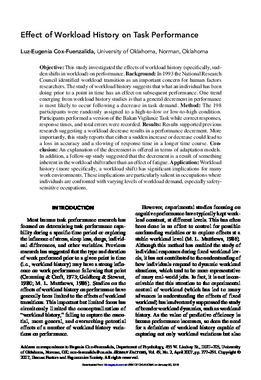| dc.contributor.author | Luz-Eugenia Cox-Fuenzalida | |
| dc.date.accessioned | 2016-01-14T19:53:56Z | |
| dc.date.accessioned | 2016-03-30T15:31:18Z | |
| dc.date.available | 2016-01-14T19:53:56Z | |
| dc.date.available | 2016-03-30T15:31:18Z | |
| dc.date.issued | 2007-04-01 | |
| dc.identifier.citation | Cox-Fuenzalida, L.-E. (2007). Effect of Workload History on Task Performance. Human Factors: The Journal of the Human Factors and Ergonomics Society, 49(2), 277-291. doi: 10.1518/001872007x312496 | en_US |
| dc.identifier.uri | https://hdl.handle.net/11244/25534 | |
| dc.description.abstract | Objective: This study investigated the effects of workload history (specifically, sudden shifts in workload) on performance. Background: In 1993 the National Research Council identified workload transition as an important concern for human factors researchers. The study of workload history suggests that what an individual has been doing prior to a point in time has an effect on subsequent performance. One trend emerging from workload history studies is that a general decrement in performance is most likely to occur following a decrease in task demand. Method: The 198 participants were randomly assigned to a high-to-low or low-to-high condition. Participants performed a version of the Bakan Vigilance Task while correct responses, response times, and total errors were recorded. Results: Results supported previous research suggesting a workload decrease results in a performance decrement. More importantly, this study reports that either a sudden increase or decrease could lead to a loss in accuracy and a slowing of response time in a longer time course. Conclusion: An explanation of the decrement is offered in terms of adaptation models. In addition, a follow-up study suggested that the decrement is a result of something inherent in the workload shift rather than an effect of fatigue. Application: Workload history (more specifically, a workload shift) has significant implications for many work environments. These implications are particularly salient in occupations where individuals are confronted with varying levels of workload demand, especially safety-sensitive occupations. | en_US |
| dc.language.iso | en_US | en_US |
| dc.publisher | Human Factors: The Journal of the Human Factors and Ergonomics Society | |
| dc.title | Effect of Workload History on Task Performance | en_US |
| dc.type | Research Article | en_US |
| dc.description.peerreview | Yes | en_US |
| dc.description.peerreviewnotes | https://us.sagepub.com/en-us/nam/manuscript-submission-guidelines | en_US |
| dc.identifier.doi | 10.1518/001872007x312496 | en_US |
| dc.rights.requestable | false | en_US |
